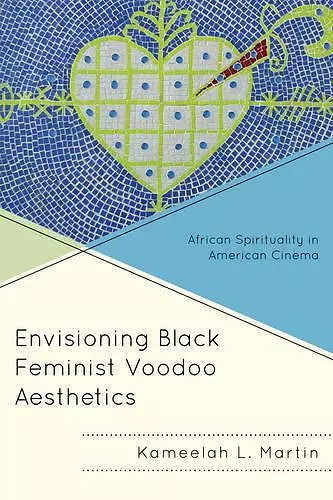Envisioning Black Feminist Voodoo Aesthetics
African Spirituality in American Cinema
Format:Hardback
Publisher:Lexington Books
Published:30th Sep '16
Currently unavailable, and unfortunately no date known when it will be back
This hardback is available in another edition too:
- Paperback£39.00(9781498523301)

In the twenty-first century, American popular culture increasingly makes visible the performance of African spirituality by black women. Disney’s Princess and the Frog and Pirates of the Caribbean franchise are two notable examples. The reliance on the black priestess of African-derived religion as an archetype, however, has a much longer history steeped in the colonial othering of Haitian Vodou and American imperialist fantasies about so-called ‘black magic’. Within this cinematic study, Martin unravels how religious autonomy impacts the identity, function, and perception of Africana women in the American popular imagination. Martin interrogates seventy-five years of American film representations of black women engaged in conjure, hoodoo, obeah, or Voodoo to discern what happens when race, gender, and African spirituality collide. She develops the framework of Voodoo aesthetics, or the inscription of African cosmologies on the black female body, as the theoretical lens through which to scrutinize black female religious performance in film. Martin places the genre of film in conversation with black feminist/womanist criticism, offering an interdisciplinary approach to film analysis. Positioning the black priestess as another iteration of Patricia Hill Collins’ notion of controlling images, Martin theorizes whether film functions as a safe space for a racial and gendered embodiment in the performance of African diasporic religion. Approaching the close reading of eight signature films from a black female spectatorship, Martin works chronologically to express the trajectory of the black priestess as cinematic motif over the last century of filmmaking. Conceptually, Martin recalibrates the scholarship on black women and representation by distinctly centering black women as ritual specialists and Black Atlantic spirituality on the silver screen.
In this highly original and impeccably researched book, Kameelah Martin examines representations of black women in visual media, from Walt Disney films to black independent cinema, and from Hollywood Voodoo movies to Beyoncé’s Lemonade. A rich, comprehensive analysis of depictions of black female healers, spirit workers, and priestesses in historical narratives and contemporary expressions of African-derived spirituality, Envisioning Black Feminist Voodoo Aesthetics shines as an outstanding work of literary criticism and interdisciplinary scholarship that greatly enhances our knowledge of the significant intersections between gender, race, religion, and popular culture. This book is especially valuable for readers in academic fields such as Africana Studies, Film Studies, History, and Religion. -- Yvonne Chireau, Swarthmore College
Kameelah Martin’s Envisioning Black Feminist Voodoo Aesthetics is a unique book long overdue in its serious assessment of the black priestess figure in popular cinema and art films. From the demonized representations of conjure women in early 1930s Hollywood movies to Lisa Bonet’s infamous portrait in Angel Heart from 1987, to the black feminist re-presentations of African spirituality offered in Julie Dash’s Daughters of the Dust and Kasi Lemmons’ Eve’s Bayou, Martin makes a compelling case for the need for black women’s counter aesthetics and “spirit work” when measured against the more popularized tropes of Voodoo practitioners as cunning, “magical,” and “mysterious” figures, which continue in such millennial films as The Skeleton Key and in Disney franchises like Pirates of the Caribbean and The Princess and the Frog. When even pop star Beyoncé casts herself in this light, with her groundbreaking visual album Lemonade, Martin is most successful in advocating for the power of transformative consciousness and healing rituals, represented by the black priestess and sustained in Black Atlantic feminist practices. -- Janell C. Hobson, University at Albany-SUNY
Riveting reading. Eye-opening! Searing in its unwavering critique and indictment of America’s deliberate demonization of Haiti and Haitian Vodun that informed Hollywood’s stereotyped and xenophobic portrayal of Vodun/voodoo, Kameelah Martin’s Envisioning Black Feminist Voodoo Aesthetics offers a well-researched, brilliant analysis of Hollywood cinema that variously portrays Haitian voodoo. Employing her “black feminist voodoo aesthetic,” Martin critically examines “vintage Hollywood Voodoo,” from the early 1930’s Love Wanga, Chloe, Love is Calling, Devil’s Daughter and later Hollywood films, like The Skeleton Key, Angel Heart, Pirates of the Caribbean, and Disney’s The Princess and the Frog. This exceptional text is an absolute must read for all literary and film scholars and critics who are interested in African spirituality, its history, and its various manifestations. -- Georgene Bess Montgomery, Clark Atlanta University
Envisioning Black Feminist Voodoo Aesthetics: African Spirituality in American Cinema paints a provocative picture of where and when black women religious figures enter the popular visual imaginary. In it, Martin makes a compelling case for considering the visual implications of black women’s spiritual appropriation anew, and includes wide-ranging forms—from popular and independent film to the imagery represented in Beyoncé’s visual album Lemonade (2016)—to reveal how they resist, engineer, or “imaginer” a black female “Voodoo aesthetic.” While recent scholarship has explored the complex ways black women are depicted in popular film, few works have attended to visual representations through the lens of religion, spirituality, and especially, the role of the black priestess figure. Envisioning Black Feminist Voodoo Aesthetics does exactly that, and lays bare the varied possibilities of black female spirituality in the moving image form. This text is a must read for those interested in Black Feminist Studies, Film and Media Studies, Religious Studies, and Africana Studies. -- LeRhonda S. Manigault-Bryant, Williams College
- Winner of College Language Association Award for Creative Scholarship 2017
ISBN: 9781498523288
Dimensions: 238mm x 159mm x 25mm
Weight: 531g
256 pages